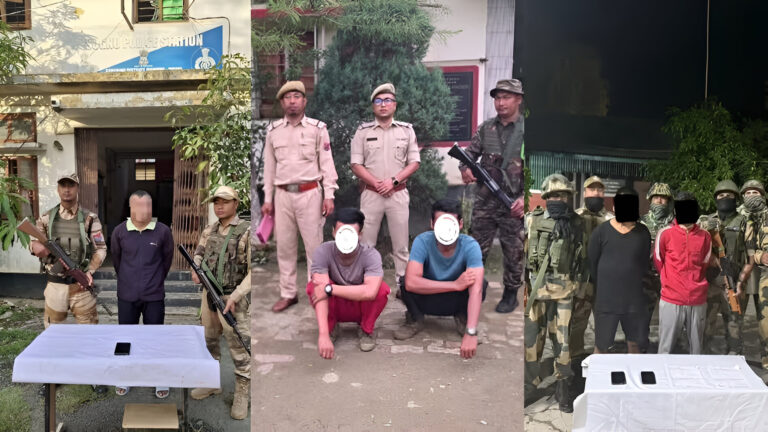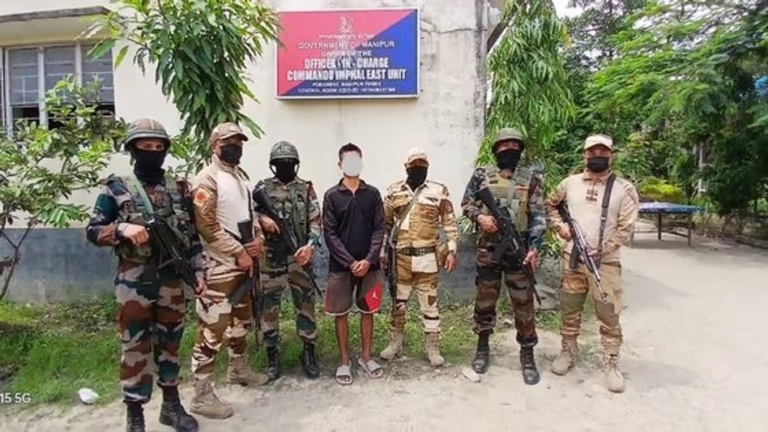Manipur Security Forces Arrest 8 Militants in Major Crackdown
In a significant operation, Manipur’s security forces have apprehended eight militants associated with various proscribed groups, marking a substantial step in the state’s ongoing efforts to combat insurgency.
Understanding Manipur’s Ongoing Battle Against Insurgency
Manipur, a picturesque state in India’s northeastern region, has long been a theater of insurgent activities. The recent arrest of eight militants by the state’s security forces underscores the persistent challenges and the relentless efforts to restore peace. Let’s delve deeper into this development and its broader implications.
The Recent Crackdown: A Detailed Account
On January 29, 2025, Manipur Police, in collaboration with central security agencies, launched a series of coordinated operations targeting insurgent elements across the state.
- RPF/PLA Operatives in Paona Bazar: Two active members of the Revolutionary People’s Front (RPF), the political wing of the People’s Liberation Army (PLA), were apprehended in Paona Bazar, a bustling commercial area in Imphal. The individuals, identified as Nepram Bothe Meitei (24) and Yengkhom Gyandas Singh, alias Dinku or Chaningkhomba (24), were allegedly involved in extorting money from local shopkeepers. The authorities recovered a .32 pistol with a loaded magazine, mobile phones, cash totaling Rs. 6,210, an Aadhaar card, and a two-wheeler from their possession.
- PREPAK(PRO) Members in Thoubal District: In a separate operation in Tentha, under the jurisdiction of Khongjom Police Station in Thoubal District, security forces arrested two active members of the People’s Revolutionary Party of Kangleipak (Progressive), commonly known as PREPAK(PRO). The detainees, Leishangthem Hemanta Singh, alias Leishemba (41), and Kiyam Open Meitei, alias Penthokpa (41), were taken into custody without reported resistance.
- Militants Near Indo-Myanmar Border: On January 28, 2025, central forces conducted an operation between Border Pillars 85 and 86 in Tengnoupal District, close to the Indo-Myanmar border. This led to the arrest of three cadres from the Kanglei Yawol Kanna Lup (KYKL) and one from the United National Liberation Front-Kanba (UNLF-K). The individuals apprehended were:
- Rishikanta Laishram, alias Malemnganba (32) – KYKL
- Poireiton Leitanthem, alias Tokio (26) – KYKL
- Naorem Yohenba Singh, alias Nongyai (26) – KYKL
- Kh. Malemnganba Meitei, alias Phoungakpa (27) – UNLF-K
The Broader Context: Manipur’s Insurgency Landscape
Manipur has been grappling with insurgent activities for decades, with multiple groups operating based on ethnic identities, political aspirations, and socio-economic grievances. These groups often resort to extortion, armed attacks, and other illicit activities to fund their operations and assert influence over local populations.
The recent arrests are part of a sustained effort by security forces to dismantle these networks. By targeting individuals involved in extortion and arms trafficking, the authorities aim to weaken the operational capabilities of these groups and restore a sense of security among the populace.
Challenges in Counter-Insurgency Operations
While the recent operations are commendable, several challenges persist in the fight against insurgency in Manipur:
- Geographical Terrain: Manipur’s rugged terrain, dense forests, and proximity to international borders provide insurgents with strategic advantages for movement and concealment.
- Local Support: Some insurgent groups have deep-rooted support within certain communities, complicating intelligence gathering and operational planning for security forces.
- Resource Constraints: Limited resources and the need for continuous training pose challenges for security personnel engaged in counter-insurgency operations.
Strategies for Sustainable Peace
To achieve lasting peace in Manipur, a multifaceted approach is essential:
- Enhanced Intelligence Gathering: Building trust within local communities can lead to better intelligence, enabling preemptive actions against insurgent activities.
- Economic Development: Addressing socio-economic disparities through development projects can reduce the allure of insurgent ideologies among the youth.
- Dialogue and Reconciliation: Engaging in dialogue with insurgent groups willing to renounce violence can pave the way for political solutions and reintegration programs.
- Regional Cooperation: Collaborating with neighboring countries, especially concerning border security, can curb cross-border insurgent movements and supply chains.
The Road Ahead
The recent arrests signify a positive trajectory in Manipur’s fight against insurgency. However, the journey towards lasting peace requires sustained efforts, community involvement, and adaptive strategies to address the evolving dynamics of insurgent activities.
FAQs
- What led to the recent arrests in Manipur?The arrests resulted from coordinated operations by Manipur Police and central security forces targeting individuals involved in extortion and militant activities across the state.
- Which insurgent groups were the arrested individuals associated with?The individuals were linked to various proscribed groups, including the Revolutionary People’s Front (RPF/PLA), People’s Revolutionary Party of Kangleipak (Progressive) [PREPAK(PRO)], Kanglei Yawol Kanna Lup (KYKL), and United National Liberation Front-Kanba (UNLF-K).
- What challenges do security forces face in combating insurgency in Manipur?Challenges include the state’s difficult terrain, local support for insurgent groups, and resource constraints faced by security personnel.
- How can sustainable peace be achieved in Manipur?A comprehensive approach involving enhanced intelligence gathering, economic development, dialogue with insurgent groups, and regional cooperation is essential for lasting peace.
- What is the significance of the recent arrests?The arrests disrupt insurgent operations, weaken their capabilities, and demonstrate the commitment of security forces to restoring




